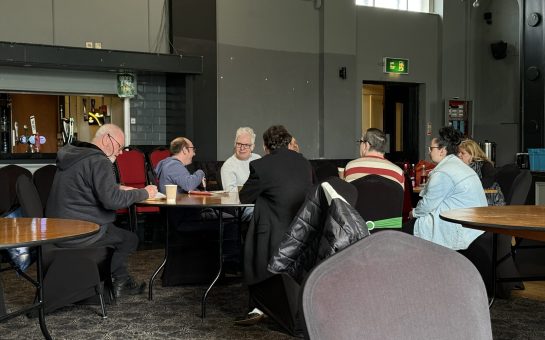Stockport barber Alex Wooliscroft is fighting back against his severe gambling habit by campaigning to get himself banned from every bookmakers in Britain.
Father of one Alex, 26 is begging every bookie to stop him coming into their betting shops after blowing £25,000 in eight years on computerised roulette machines.
Already Alex has handed photographs of himself to bookmakers near his home in Stockport urging them to refuse him admittance after he became addicted to playing the ‘fixed odds’ terminals.
Today he began a round of TV and radio interviews in a further bid to make his self-imposed and very public anti-gambling crackdown work.
Alex, from Offerton, who has an eight-week-old baby said: ”These high-stakes games are evil and are more addictive than drugs. They are ruining my life and I will do anything to kick the habit.
”I’ve been to counselling groups and meetings and tried to get help. It’s even given me a stutter. I just need the help of bookmakers themselves to stop people like me throwing good money away when it is clear they have a gambling problem.”
Alex developed his gambling habit when he was 18 but only began to realise he had a problem four years ago and began distributing his photograph to bookmakers as part of his ‘self-exclusion.’
Yet in September 2012, Alex succumbed to temptation went into a Stockport casino and lost £700 in three minutes.
It led him to have that day’s date ’26/9/12′ tattooed on his hand to remind him of the loss. But after six months without placing a bet, he started gambling again last March.
The following July he redistributed his photograph to bookmakers but earlier this month Alex lost £240 at a William Hill in three minutes on a high-stakes roulette machine.
He said: ”I have been a compulsive gambler since I was 18. It’s slowly got worse and I have tried everything in my power to try and stop. I have even had hypnotherapy and I have got a tattoo of a date of a big loss.
”On the date of my tattoo I lost £700 in two spins of a wheel. It took me 3 minutes.
“I own my own barber’s shop and have worked as a barber since age 19 – after bills and tax I gamble everything else away.
“It is my fault – it’s all my fault – but I have done everything I can to try and stop.
“I pay rent, I don’t take food of my baby’s mouth but I do gamble away the money that’s left over from my daily takings.
“I don’t know what it is about gambling that makes it so addictive, I guess it’s the fantasy of winning, it’s the buzz.
“For the 20 seconds when that ball is spinning and you have a lot of money on a number and it’s spinning around it’s 20 seconds of hope. It’s thrilling.
“But then when you lose it is sickening. I have cried, I have been sick, I have ripped the shirt off my back.
“I went to bookies about 4 years ago in Stockport and self-excluded myself then last summer I went to seven Stockport bookies and self-excluded myself.
“It takes ten minutes, you just fill in a form and take in a photograph of yourself and it is then supposed to be their responsibility not to allow you to gamble.
“But on January 13 I went in one of the betting shops where I had self-excluded myself and lost £300. Two days later I lost £240.
”They have a book behind the counter that has my picture in it. They are not supposed to let me in. I asked a member of staff if he could please remove me if he sees me in the shop again.
”They don’t want to seem to want to help me. What I would like them to do is their job, they should stick to their policy – self-exclusion gamblers are not allowed to gamble.”
Figures by the Campaign for Fairer Gambling said there were 47 licenced betting shop in Alex’ hometown with millions gambled away on fixed-odds terminals in 2012. Punters can gamble up to £100 every 20 seconds or £18,000 an hour.
Adrian Parkinson consultant to the campaign said: ”Bookmakers have brought casino games onto the high street – we need to catch up in terms of regulation.”
William Hill said the company had approved 500 ”self-exclusions” across Britain but said ‘it is not fool proof’. The firm’s new policy requires self-exclusions to be renewed each year instead of every five years.
A spokesman added: ”Self-exclusion is exactly what it says. We try to police it as best we can, but if someone does manage to place a bet, the bet will stand – win or lose.
”We reached out on several occasions to Mr Wooliscroft to attempt to tailor a solution above and beyond our usual processes – to assist him with his attempts at recovery.
”We would urge him to take up these opportunities and meet with our senior management so we can complete the process.’’
Image courtesy of Hakan Dahlstrom, with thanks
For more on this story and many others, follow Mancunian Matters on Twitter and Facebook.



